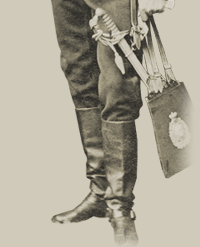

 |
|
GlossaryGlossaries have been created to provide the definition for words specific to each theme area. It is suggested that students review the glossaries before they examine a specific theme area. For example, the Ranching Glossary contains many terms such as "greenhorn," "heifer," or "wrangler," that only a rancher or cowboy might know. 49th parallel: The main border between Western Canada and the United States. Located on the 49th degree of latitude. Agriculture: The science of cultivating soil, producing crops, and raising livestock. Apprentice: A person who has agreed to work for another person for a specific amount of time in order to learn a trade, art, or business. Bastion: A protrusion from the corner of a fort or wall that allows people inside the fort to fire along the outside perimeter of the walls. These enabled soldiers to defend the ground close to the walls. Bootleg: To make, sell, or transport (alcoholic liquor) illegally. Carcass: The dead body of an animal. Congregation: The members of a specific religious group who regularly worship at a church or synagogue. Convent boarding school: A school where students are provided with meals and accommodation run by a group of nuns who have made vows to a religious life. Country Wife: A relationship between a non-native fur trader and a First Nations or mixed-blood woman. Drainage basin: The whole area drained by a river system. Expansionist: The practice or policy by a nation of territorial or economic expansion. Frontier: The region beyond or at the edge of a settled area. Furlough: A leave of absence or vacation granted to a member of a military force. Geographer: The study of the physical characteristics of the earth and its features and of the results of human activity on the planet. Gun-holes: A small space in a fort wall that allows soldiers to fire their weapons outward from their fort, yet still be protected from enemy gunfire by the wall. Habit: The distinctive item of clothing worn by members of a religious order. Hudson's Bay Company (HBC): The oldest (formed in 1670) company in Canadian history; it was important in the fur trade and the exploration of Canada. Jesuit: The common name for a religious order of priests and brothers in the Catholic Church called the Society of Jesus. Maverick: There are two main definitions.
Member of Parliament (MP): An elected member of the Canadian Federal Government who sits in the House of Commons. Metis: A person of mixed First Nations and French-Canadian ancestry. Militia: An army composed of ordinary citizens rather than professional soldiers that is usually only called into service in times of emergency. Missionary: A person who is sent to do religious or charitable work, usually in a foreign country, and attempts to persuade or convert others to their own beliefs. North-West Rebellion (1885): A provisional government was proclaimed in the west by Louis Riel in March, 1885, especially because of broken promises by the Federal Government to the First Nations and Metis groups. It was eventually overthrown with the capture of its capital Batoche on 12 May 1885. Riel was taken prisoner and later hanged for treason. Nun: A woman who belongs to a religious order and is devoted to active service to the church, and lives under vows of poverty, chastity, and obedience. Rectory: The official residence provided by a church for the managing priest of an area. Semi-cloistered: To be partially shut away from the world. Sextant: A navigational instrument used for measuring the altitudes of celestial bodies from the horizon to determine latitude and longitude. Smallpox: A highly infectious, often fatal disease characterized by high fever and aches with subsequent widespread eruption of pimples that blister and form pockmarks. Surveyor: A person who determines the boundaries and elevations of land and land features such as lakes, rivers, and mountains. Viscountess: The wife of a nobleman who ranks below an earl or count but above a baron. Voyageur: A person employed by a fur trade company to transport furs, goods, and supplies between wilderness areas and outposts. |
![]()
Mavericks Home
| Student Resources Home |
Teacher Resources
Contact
| Site Map | Credits
© Copyright Glenbow Museum, 2006. All Rights Reserved
